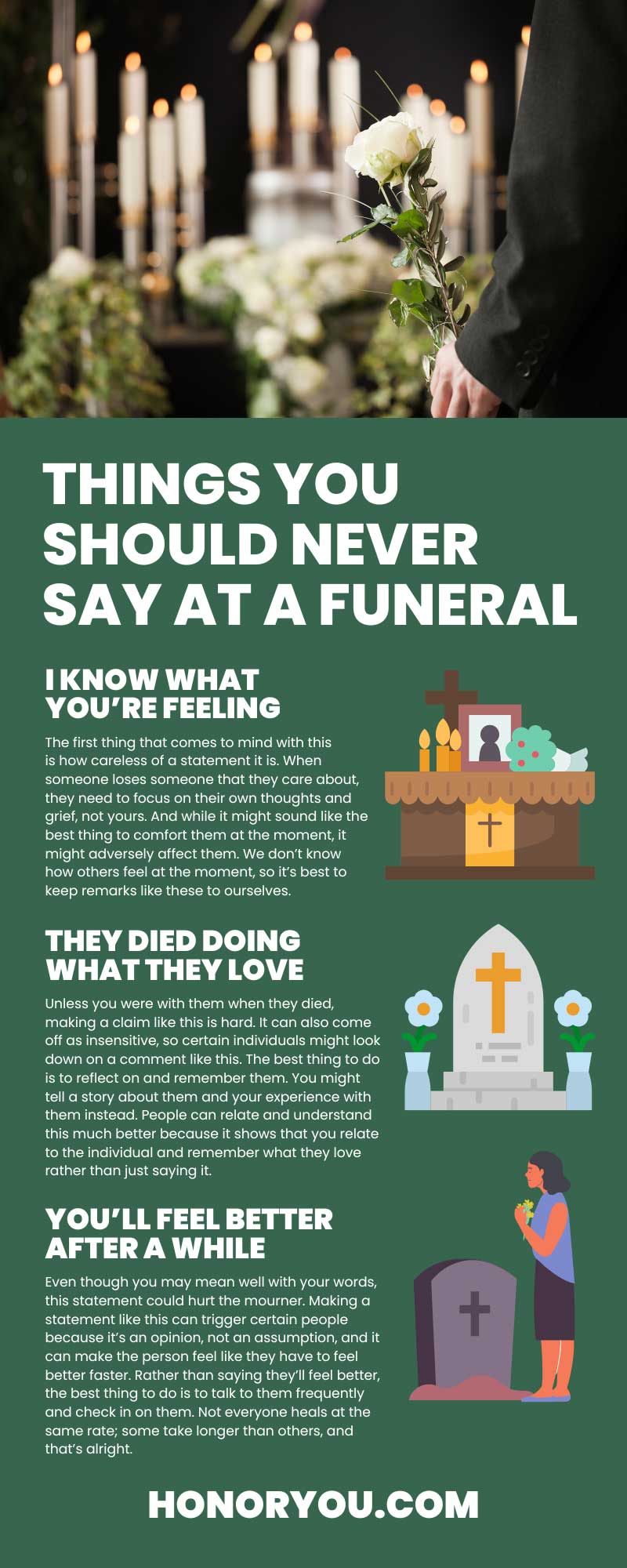10 Things You Should Never Say at a Funeral

When Is the Right Time To Offer Condolences?
February 6, 2023
What Is Appropriate To Wear to a Funeral?
February 17, 2023It can be difficult to determine how to interact with people during a time of mourning, such as after the death of someone they know and love. Whether we should laugh or cry is up to us and how the passed loved one would have wanted us to remember them. Some people enjoy sharing stories about the fallen, while others would rather not say much.
So we may have to set aside individual feelings and thoughts during the funeral, as everyone should follow a certain level of etiquette. Here are the 10 things you should never say at or after a funeral while the congregants take this time to mourn.
I Know What You’re Feeling
The first thing that comes to mind with this is how careless of a statement it is. When someone loses someone that they care about, they need to focus on their own thoughts and grief, not yours. And while it might sound like the best thing to comfort them at the moment, it might adversely affect them. We don’t know how others feel at the moment, so it’s best to keep remarks like these to ourselves.
They Died Doing What They Love
Unless you were with them when they died, making a claim like this is hard. It can also come off as insensitive, so certain individuals might look down on a comment like this. The best thing to do is to reflect on and remember them. You might tell a story about them and your experience with them instead. People can relate and understand this much better because it shows that you relate to the individual and remember what they love rather than just saying it.
You’ll Feel Better After a While
Even though you may mean well with your words, this statement could hurt the mourner. Making a statement like this can trigger certain people because it’s an opinion, not an assumption, and it can make the person feel like they have to feel better faster. Rather than saying they’ll feel better, the best thing to do is to talk to them frequently and check in on them. Not everyone heals at the same rate; some take longer than others, and that’s alright.
Their Death Was a Part of the Divine Plan
Before anything else, you should never assume that everyone has the same religious perspective. Many people don’t believe in a God, and those who do may have a different divinity that they worship. We can never know about their belief system if they don’t share it with us while alive. Therefore, you should never assume to know where they stand with their beliefs.
They Can No Longer Feel Any Pain
Again, you need to be careful about making statements like these. When someone says something of this degree about the person who passed away, it showcases a lack of integrity. While the intention might have been to comfort the mourning individual, you might have offended them, as it implies that the passed loved one lived a negative life. Speaking about the positive aspects of their life is what many people prefer to hear in these moments.
I Guess It Was Meant To Be
No one can know how long they have to live, but saying that someone dying was “meant to be” could be upsetting. When you’re with someone who’s mourning, you could instead say that they may not have lived long on this Earth, but they lived a full life. Something like this shows that you knew the person well and they left an impact on the world.
They Are Now in a Better Place
If anyone says something about another individual passing on, it should be a minister. To openly make a comment like this might suggest that you have knowledge about the unknown, which takes the attention off of the person altogether. The point of a funeral is to celebrate and remember the person. As far as we know, regardless of belief or logic, no one knows for sure what comes after life, so don’t assume that you know.
Let Me Know if I Can Help
In most cases, if the individual needed some help, they would have asked for it while they were mourning. Most of the time, people prefer to be alone so that they can process all that has transpired. Those who genuinely need help will find a way to express it, so don’t push yourself on someone who wants privacy.
They Lived a Good Life
Sometimes reiterating what the minister or the priest has said is overdoing it. In this case, because it’s still early and you’re at the funeral, it might be a good time to reserve that particular memento for another time. You might instead revert the conversation to talk about the best years of their life with the person that you’re speaking to and highlight what made them so special. This will have more impact than simply saying they lived a good life.
Not Saying Anything at All
This is one you’ll need to measure with caution. Sometimes it’s best not to say anything or to say very little. If you feel that it would be best not to mention anything, you can always sign the memorial register book to honor the individual and show your attendance. And there’s no official guideline for what you write other than your sheer intuition.
Whether you speak in person or write in the memorial book, always try to talk to the family of the deceased at least a little. Sometimes talking about nothing at all can help to soothe the pain of loss. You don’t have to stay on the topic of death, either. Feel out the discussion as much as you can without saying something that may potentially trigger and upset the other person in conversation.
This outlines 10 things you should never say at a funeral and why it’s important that you don’t mention them. There’s a time and a place for everything that we say and do, so we must be careful about how we communicate with people, especially in moments that can be touchy.



